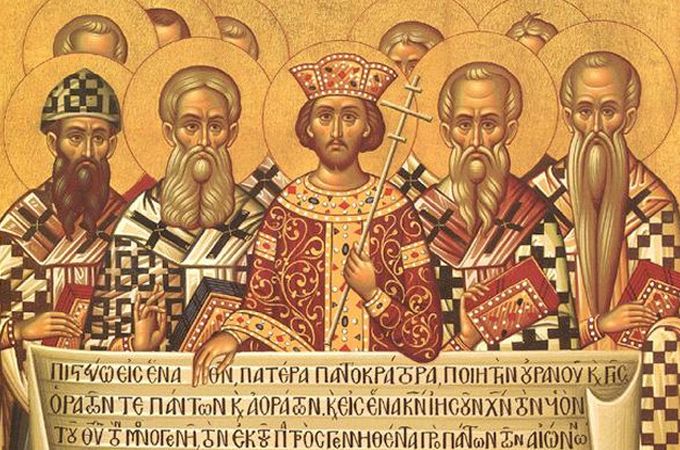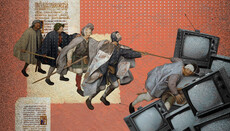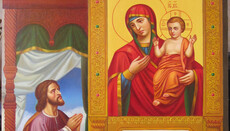Is Christ Divided? About Church Schisms in the Language of Holy Fathers

Today a lot of people are wondering how the organization which calls itself the church could lose the grace of the Most Holy Spirit. Is it possible that God does not listen to the prayers of schismatics and their "rites" are not sanctifying grace? And on the whole – what is the essence of schism?
Before you find answers to these important questions, you need to delve into the history of the Church to learn if something similar happened before modern church dissents.
If you start to explore in detail the history of the Church, it becomes clear that schism is not something new to Christianity, and all the things that we see now have been before. Dissents have been shaking the Church of Christ since its foundation, and they are based, most often, on someone's pride, the desire to gain influence and fame, less often – the spread of distorted teachings.
Anyway, the general position of the Church to dissents is unanimous – they are an evil that is brought into the church environment to divert believers from the true path to Salvation. The Lord as a merciful Father does not want the sinner's death, and therefore deprives schismatic formations of His invigorating grace. Evidence of this is found in the writings of the Holy Fathers of Orthodoxy, church canons, and even in the Holy Scriptures.
Comparing schism with heresy, St. John Chrysostom states that "schism is no less evil than heresy." St. Cyprian of Carthage teaches: "Remember that the founders and leaders of schism, breaking the Church unity, oppose Christ, and not only crucify Him for the second time, but torn the Body of Christ – and it is such a grave sin that the blood of martyrdom cannot make reparation for it!”
St. Optatus, Bishop of Milevis (IV century), considered "schism to be one of the greatest evils – more than murder and idolatry."
In today's sense the word “schism” occurs for the first time in St. Hippolytus of Rome. He broke with the Pope Callistus (217-222), whom he accused of weakening the church discipline requirements.
The main reason for the dissents in early Church is the consequences of persecution: Decius (Novatus and Felitsissima in Carthage, Novatian in Rome) and Diocletian (Irakli in Rome, the Donatists in the African Church, the Meletians in Alexandria), as well as the dispute over the baptism of heretics. Major contradictions were caused by the issue on the procedure of acceptance to the Church of "the fallen" – those who denied Christ and fell away during the persecutions.
The question of the nature and meaning of church divisions and schisms was raised acutely in the baptismal controversy of III century. St. Cyprian of Carthage with the inevitable coherence advocated a doctrine of absolute ungracefulness of any schism: "We must beware of deception, not only apparent and obvious, but one that is covered with fine wickedness and cunning, as in the fiction of the enemy of a new deceit: to use a Christian name to deceive the unwary. He invented heresies and schisms to overthrow faith, to distort the truth and to break unity. Who cannot be kept in blindness in the old way is deceived and tempted in the new one. He catches people from the Church, and when they are apparently almost approaching the light and getting rid of the night of this world, he is again holding out the new darkness on them, so that they think to be walking in the light, actually wandering in dark, not following the Gospel and not keeping the law, however, considering themselves Christians "(Book about the Church Unity).
In schism prayer and almsgiving are fed by pride – it is not virtue, but the opposition to the Church. They (schismatics’) ostentatious kindness is merely a means to tear people away from the Church. The enemy of the human race is not afraid of the prayer of a proud- hearted schismatic, because the Scripture says: "Let his prayer become a sin." (Psalm 108: 7.). Devil doesn’t take seriously their (schismatics’) vigils and fasts because he doesn’t sleep and eat himself, but this does not make him a saint.
St. Cyprian of Carthage writes: "Can one who does not adhere to the unity of the Church, be thought to keep faith? Can one who confronts and opposes the Church hope that he is in the Church, when the blessed Apostle Paul, speaking of the same subject and revealing the mystery of unity, says: "There is one body and one Spirit, even as ye are called in one hope of your calling. One Lord, one faith, one baptism, one God and Father of all, who is over all and through all and in all."(Eph. 4, 4-6)?
It is characteristically of schismatics to believe that all the other dissents, except theirs, are destructive and false, arising under the influence of passion and pride, and their own dissent, which is not much different from the others, is taken as the only happy exception in the whole history of the Church.
Schismatics, shedding crocodile tears over the "violation" of the Church canons, in fact, long ago threw under their feet and desecrated all the canons, because these rules are based on the belief in the unity and eternity of the Church. The canons of are granted to the Church, and outside the Church they are invalid and meaningless – because the laws of the state cannot exist without the state itself.
Hieromartyr Clement, Bishop of Rome, writes to Corinth dissenters: "Your division corrupted many people, many fell in depression, many – in doubt, and all of us – in sorrow, while confusion of yours is still going on."
"The Church is one, and only It possesses the fullness of the grace of the Holy Spirit gifts. Who and how would anyone abandon the Church – in heresy, in schism, in unauthorized gathering, he loses the sacrament of God's grace; we know and believe that the falling away into schism or heresy or sectarianism is a complete death and spiritual death "– so expresses the orthodox doctrine of the Church the Holy Martyr Ilarion (Troitsky).
People who are prone to distortion of faith even the word "schism" tend to use less. They say: "the official Church" and "unofficial" or "different jurisdictions", or prefer to use acronyms.
St. Philaret of Moscow said: "Orthodoxy and schism are so opposite to each other that the protection and defense of Orthodoxy should naturally complicate the schism; leniency to schism should naturally make it hard for the Orthodox Church."
So, we can see that the Church's voice regarding schism has been heard through centuries. Church schism is a wound which needs healing, a dry branch which must be cut off. During every Divine Liturgy we sing "Creed", which affirms that we believe: "... in the one, holy, catholic and apostolic Church," thereby testify that the unity of the Church of Christ is one of the most important aspects of the Doctrine of Faith for Christians.
Christ Himself said: "I will build my church and the gates of hell shall not prevail against it" (Matthew 16:18.). Did it go about the "churches"? Obviously – no! Therefore, an important duty of every Orthodox today is compliance with the principle of the Church. "Is Christ divided?" – asks Paul the Corinthian Christians who also began to divide the Church. No! And Christ is one, and His Church is the only one!
Therefore, we have no right to put up with the church schism, but we must pray to God to show the fallen away the way to full repentance and return to fold of the Mother Church.
Information-analytical portal "About the Church"











